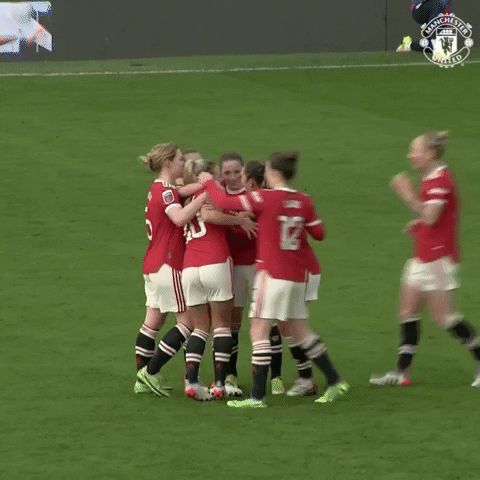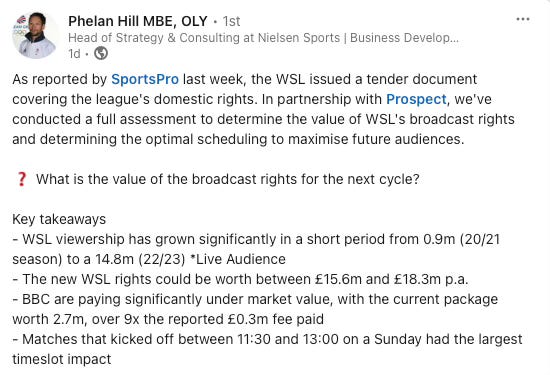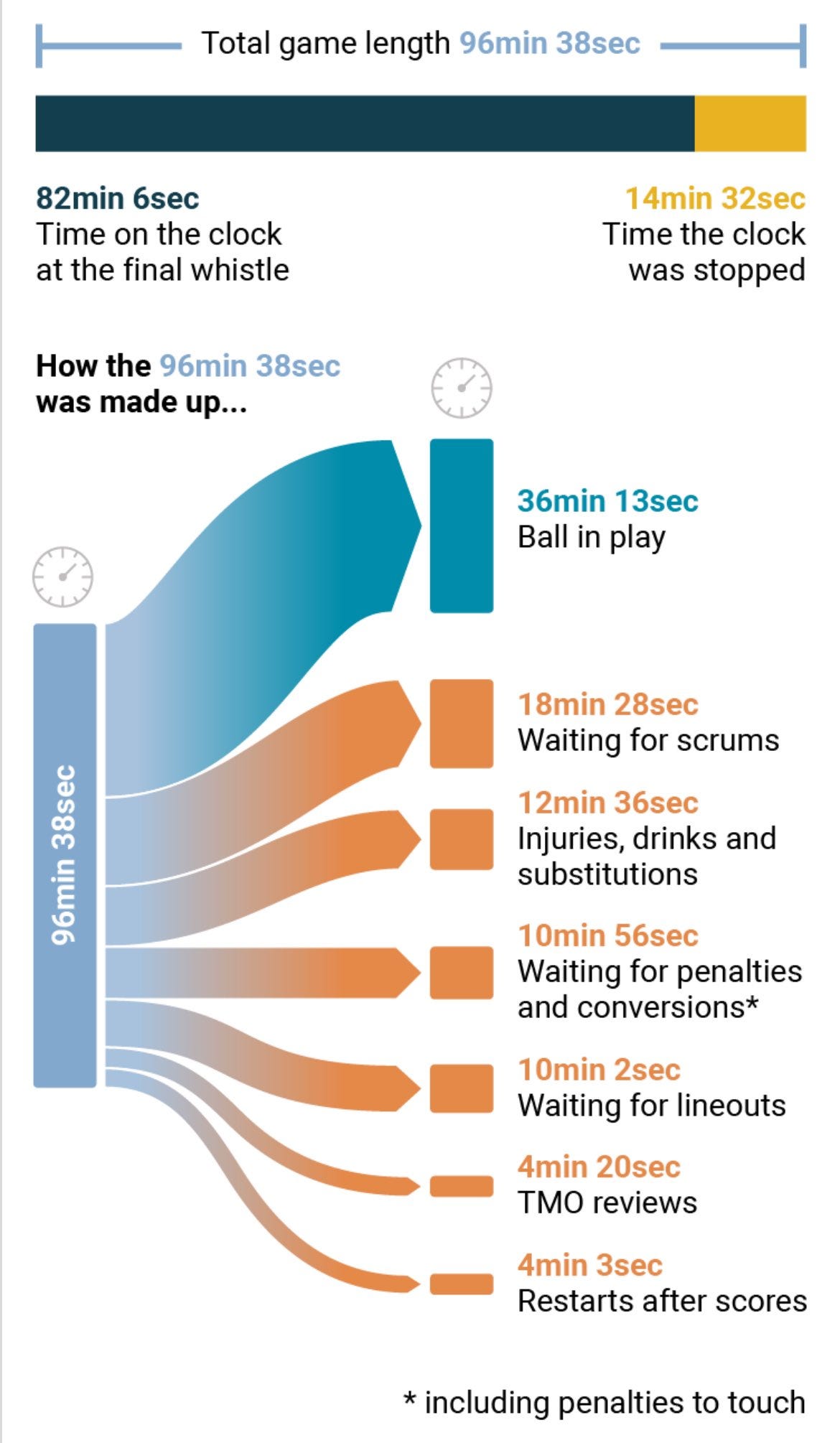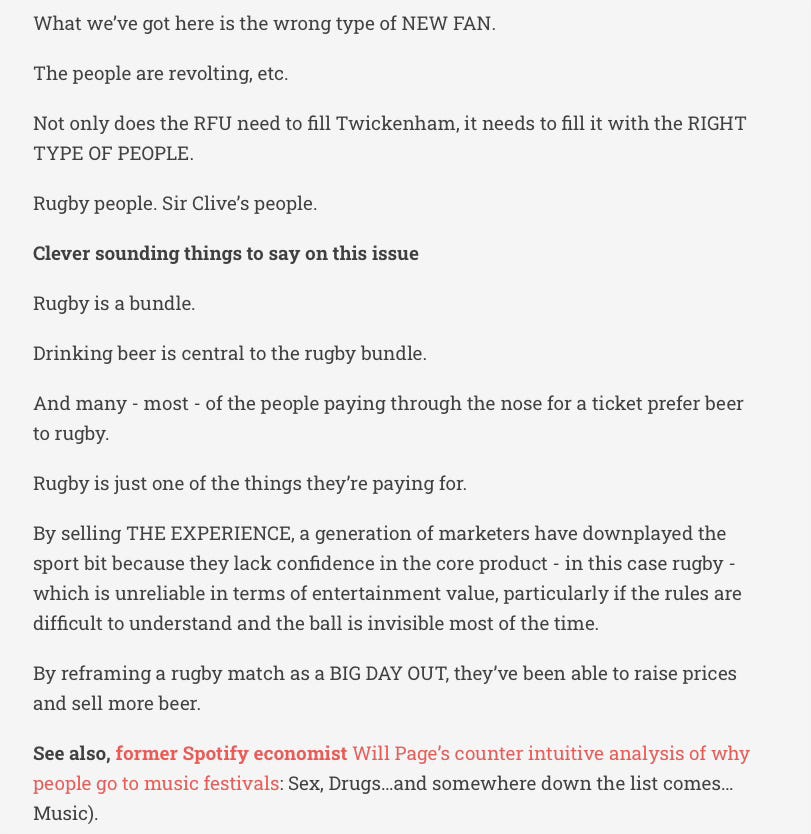Northern soul; Tax and the United stadium; A Question of Attribution; Twickenham as Heathrow Airport; The Rugby Bundle; What charity reveals about us; Luke the Nuke; The WSL rights tender
Overthinking the sports business, for money
This week’s newsletter is sponsored by SportAccord
SportAccord World Sport and Business Summit is taking place in the UK this year at Birmingham’s ICC from 7th to 11th April. Global leaders and senior executives from over 125 International Sport Federations, the IOC, rights holders, professional leagues, host cities and major event organising committees from all continents will be meeting to make decisions that will shape the future of sport.
With a thought-provoking conference programme, busy exhibition and a host of networking events, evening receptions and cultural activities SportAccord is your chance to organise a year’s worth of meetings in a week with executives from across the global sport ecosystem. Senior execs from FIBA to FORTNITE, from FIA to Kansas City Chiefs don’t miss the chance to rub shoulders with the world's sports and business leaders. Visit sportaccord.sport for more information.
A Question of Attribution and the price of women’s football
Quite often, the point is made that there’s a dearth of good data on women’s sport.
That feels like it’s changing.
This week Man Utd released accounts for the women’s side of the business.
Kieran Maguire did a thorough Kieran Maguire-esque job of rendering the numbers understandable.
The issue is attribution.
How much do the accountants allocate to the women’s side from say, the TeamViewer shirt deal, that covers men’s and women’s teams.
Sarah Batters wrestled with this whilst at Southampton - see the WhatsUP exchange this week:
Worth recalling Kevin Smit, head of TeamViewer’s sponsorship team, when he was on stage at DAZN for the Unofficial Partner Billion Dollar Women’s Football Brainstorm.
I asked him where the women’s shirt fitted in to the company’s decision to sponsor United.
Kevin Smit: It was just part of the bundle really. I think that's the current challenge in the market and the model, because it's all bundled really, the focus generally goes on the men.
The woman's league is currently just mimicking the mens and it'd be interesting to understand whether the fans want that to stay the way it is. How long will it take before they get bored? But as a brand, I'm not looking to invest in the same thing twice. So really I'd be looking for something that offers me some differentiation, that actually gives me some global reach, because currently the women's game is very Eurocentric.
There’s a direct line between United’s accounts and Nielsen’s value estimates of the WSL domestic media rights, the tender for which has just gone out.
Phelan Hill gave a summary (There’s a link to the Nielsen/Prospect report on the link).
Northern soul
Our conversation with Jason Stockwood this week has been provoked a big response.
The Grimsby Town owner is articulating what a lot of people want to hear, that a football club has a meaning beyond its financial asset value.
Football serves as an alibi for intimacy, an excuse we sometimes need to be together. The matchday rituals represent certainty, comfort, and hope in an increasingly complex world. We can orient ourselves and sometimes anchor ourselves by sharing the same experiences and spaces. It’s a chance to do something and nothing together for a few hours each week. The first day of the season reminded me of the first day back at school – people greeting each other like they hadn’t seen each other for years, animated by familiarity and excited about the renewal that the space of six weeks has opened up for us all.
Jason Stockwood: The free market is a myth. All systems need operating boundaries with checks and balances if we want a market to be healthy and competitive. Outside football, in recent decades we have seen companies abandon working-class communities in places like Grimsby in favour of cheaper labour overseas. In football we see a similar kind of process, as super-rich individuals use brute force to achieve success by underwriting losses. Even if those individuals are acting honourably, which many are, it distorts the market for everyone. And crucially, when it doesn’t work it leaves the kind of disastrous mess we have seen at Bury, Wigan Athletic and Macclesfield Town in recent years.
He was interesting on Ryan Reynolds too, particularly in relation to ‘towns like Wrexham and Grimsby’.
My sense from him and our brief conversation is they're doing it for the right reasons. And long may that last. Towns like Wrexham, towns like Grimsby need that story. We need to stop looking to the mining industry and the fishing industry and defining ourselves entirely by the past.
We can be proud of those things, but it's not going to help us navigate the future. And Wrexham have got some of that now. And so I think net-net, it's positive.
Let’s pull that thread for a moment.
I’m all in on Jason Stockwood’s vision for Grimsby.
So why is my scepticism more acute when it comes to another rich man’s northern powerhouse story that’s getting airtime this week?
Jim Ratcliffe’s interview with Dan Roan was from the deep-pockets-short-arms NFL owner’s playbook.
This views the state as just a bank full of other people’s tax money.
Ratcliffe went full ‘northern powerhouse’, seeking to generate a bit of north-south culture war action.
He didn’t mention that he lives in tax exile or the Glazer’s side stepping of a £100million tax bill from the sale of their stake.
The owners are expected to avoid the bill after listing the club in the Cayman Islands, where there is no capital gains tax.
I’m with Tracey Crouch:
“Sir Jim Ratcliffe knew what he was taking on when he bought into Manchester United. Old Trafford may need upgrading to meet today’s standards, but funding should not come out of the taxpayer’s pocket to benefit the billionaires who own the club – especially as other clubs like Bury have faced ruin, devastating the town around them, with no bailout from the public purse.”
What charity reveals about us
Next week, I’m hosting a conversation about charity, at the 20th Anniversary do for Access Sport.
It’s a treat for me, as I’m in awe of the vital work done by the organisation.
But what should we talk about?
The panel and the audience are very high end; There’s a lot of expertise in the room.
While doing research (Googling ‘Charity’), I found a stat that I can’t beyond.
In 1948, 98% of British citizens felt there was no ongoing role for philanthropy. The creation of the welfare state, they felt, made charity superfluous.
I’m wondering what the percentage would be today, after decades of neo-liberal government, which reframes the welfare state as ‘nationalised charity’.
Which is why tax is an important topic when it comes to sport - see Ratcliffe and Man United above.
Luke the Nuke’s New Deal
This week Luke Littler signed a big new contract with his darts supplier Target.
Here the Target man on our recent pod.
No wonder everyone at Twickenham’s on the piss.
This graphic from The Times breaks down how much actual rugby goes on during a rugby game.
Seen through this lens, the average international is an hour and a half of admin, with some rugby attached.
I’ve waited less at Heathrow Airport.
Given the price of tickets, it’s not what you’d call value for money.
Unless you’re there to drink, which is deemed a problem by Witchfinder General Sir Clive Woodward and the England’s Jamie George creative brainstorm committee.
See also: Sir Clive Woodward v Big Eventers
See previous note on the sports event bundle.
UP Coming
Some future podcasts.
The Bundle on that new sports streamer.
What’s Manchester City’s shirt really worth?
The Saudi Question
Sport’s Energy Category
The Cookiepocalypse
Banks and sport
Press the Like button below. Ta very much.









